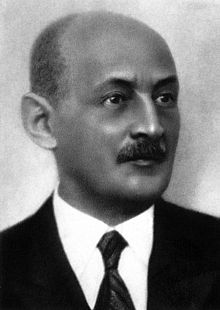Janko Jesenský
Janko Jesenský (born December 30, 1874 in Turz-St. Martin , Austria-Hungary , † December 27, 1945 in Bratislava ) was a Slovak lawyer , civil servant and writer.
Life
During his school days Janko Jesenský u. a. the grammar schools in Banská Bystrica and Kežmarok . Already here he came into contact with the Slovak national movement, which turned against the Hungarian authorities against the Magyarization of Slovakia. After graduating from high school , Jesenský studied law in Prešov , Budapest and at the University of Cluj in Transylvania , where he also received his doctorate. He then worked for several years for lawyers in various Slovak cities and was already active as a writer. In 1905, Jesenský passed the bar exam in Budapest. In the same year he caused a sensation with his volume of poems Verse . From 1906 to 1914 he ran his own law firm in the Hungarian-dominated town of Bánovce nad Bebravou , where he had a passionate love affair with the pianist Olga Kraft.
When the First World War broke out , Jesenský was arrested as a traitor by the Austro-Hungarian authorities because of his pro-Slovak involvement. However, because of an illness, he was first taken to a hospital. After his release, Jesenský was forcibly recruited and, after a short training period, transferred to the Eastern Front. To avoid military service in the Austro-Hungarian army , Jesenský deserted like many other Czechs and Slovaks. He was first sent to Russian internment camps and eventually enlisted in the Czechoslovak legions in Russia . There Jesenský experienced the October Revolution in 1917 and welcomed it as the collapse of the old monarchist order. After the peace of Brest-Litovsk , Jesenský regretted the departure of Russia from the Entente and thus the loss of an ally in the fight against the Habsburg monarchy. His idea of a Russian liberation of his homeland did not come true. With his influence, Jesenský tried to keep the Czechoslovak legions out of the Russian civil war . In this course he reached Siberia , from where he finally returned to his homeland, Czechoslovakia .
Jesenský entered the civil service and became a bailiff in Gemer and Nitra . In 1929 he became a civil servant in the Bratislava State Office , most recently as its vice-president. After the destruction of the Czechoslovak Republic by the National Socialists in 1938 and the establishment of the pro-fascist Slovak state under Jozef Tiso in 1939, Jesenský retired from civil service and withdrew from the public. With the means of the poet he supported the resistance against the Tiso regime and its German allies. After the victory of the Red Army over the Axis Powers, Jesenský stood up for the restoration of Czechoslovakia as an ally of the USSR .
honors and awards
- 1991 in memoriam: Grand Cross Tomáš Garrigue Masaryk Order of the Czechoslovak Republic.
Works
- Taraj the dog (1897)
- Captain Talapka (1897)
- Verses (1905)
- Slaves (1905)
- Small Town Stories (1913)
- The Editor (1913)
- Mushrooms (1913)
- The Dinner (1913)
- Novellas (1921)
- On the Road to Freedom (Memoirs) (1933)
- The Swap of Spouses (1934)
- King David (1934)
- From Old Times (1935)
- One file, one small file ... (1935)
- For the sake of a better qualification (1941)
- Two Bears (1941)
- Fear (1941)
- Democrats
Web links
- Literature by and about Janko Jesenský in the catalog of the German National Library
| personal data | |
|---|---|
| SURNAME | Jesenský, Janko |
| BRIEF DESCRIPTION | Slovak lawyer, civil servant and writer |
| DATE OF BIRTH | December 30, 1874 |
| PLACE OF BIRTH | Turz-St. Martin , Turz County , Kingdom of Hungary , Austria-Hungary (today: Martin , Slovakia ) |
| DATE OF DEATH | December 27, 1945 |
| Place of death | Bratislava , Czechoslovak Republic |
